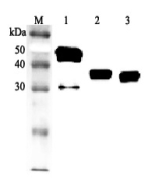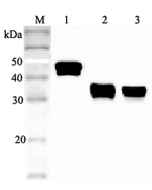Cookie Policy: This site uses cookies to improve your experience. You can find out more about our use of cookies in our Privacy Policy. By continuing to browse this site you agree to our use of cookies.
AdipoGen Life Sciences
anti-Clusterin (human), pAb (Biotin)
As low as
280
CHF
CHF 280.00
In stock
Only %1 left
AG-25A-0099B-C05050 µgCHF 280.00

Figure 1: Western blot analysis using anti-Clusterin (human), pAb (Biotin) (Prod. No. AG-25A-0099B) at 1:2'000 dilution.
1: Human Clusterin (His-tagged).
2: Human serum #1 (1μl).
3: Human serum #2 (1μl).
| Product Details | |
|---|---|
| Synonyms | TRPM-2; Apolipoprotein J; APO-J; CLI; CLU; SGP-2 |
| Product Type | Polyclonal Antibody |
| Properties | |
| Source/Host | Rabbit |
| Immunogen/Antigen | Recombinant human clusterin (nuclear form). |
| Label/Conjugates | Biotin |
| Application |
ELISA: (direct and indirect: 1:2’000-1:5’000) Western Blot: (1:2’000-1:5’000 using ECL; suggested blocking and dilution buffer is PBST containing 0.05% Tween 20 and 5% skim milk; suggested incubation time is 1 hour at room temperature). Optimal conditions must be determined individually for each application. |
| Crossreactivity | Human |
| Specificity | Recognizes human clusterin. Detects a band of ~49kDa by Western blot. |
| Purity Detail | Protein A-affinity purified. |
| Concentration | 1mg/ml |
| Formulation | Liquid. 0.2μm-filtered solution in PBS, pH 7.4. Contains no preservatives. |
| Shipping and Handling | |
| Shipping | BLUE ICE |
| Short Term Storage | +4°C |
| Long Term Storage | -20°C |
| Handling Advice |
After opening, prepare aliquots and store at -20°C. Avoid freeze/thaw cycles. |
| Use/Stability | Stable for at least 6 months after receipt when stored at -20°C. |
| Documents | |
| MSDS |
 Download PDF Download PDF |
| Product Specification Sheet | |
| Datasheet |
 Download PDF Download PDF |
Description
Clusterin shares homology with the small heat shock protein family of molecular chaperones. The mature secreted form of the protein is a glycosylated, 80-kDa disulfide-linked heterodimer of alpha and beta subunits (produced by internal cleavage). Clusterin is expressed in virtually all tissues and found in all human fluids. It is involved in numerous physiological processes important for carcinogenesis and tumor growth, including apoptotic cell death, cell cycle regulation, DNA repair, cell adhesion, tissue remodeling, lipid transportation, membrane recycling, and immune system regulation. Clusterin also exists as a nuclear protein. The secreted form of Clusterin has extracellular chaperone and anti-apoptotic activities while the nuclear form acts as a proapoptotic factor.








